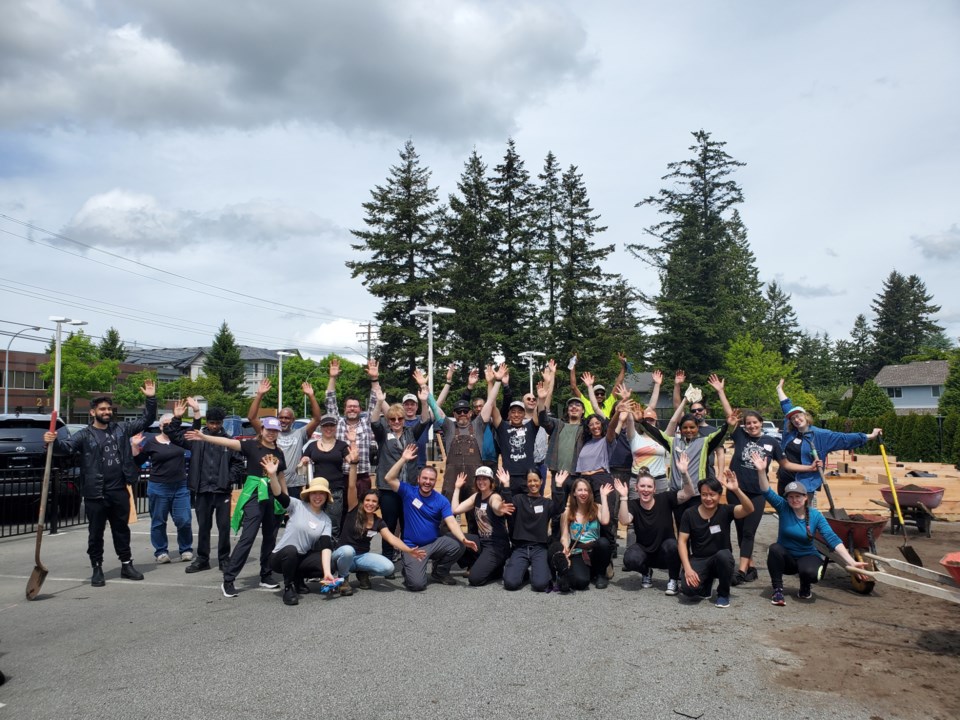For Nasrin Ali, pulling a bag of home-grown peppers from her freezer in the midst of a miserable Vancouver winter is the dream.
But she never thought this dream would come true in the parking lot of a car dealership five minutes away from her Surrey home.
On June 4, in the parking lot of the White Rock Volkswagen dealership, a 64-plot community garden was built by 50 volunteers. A collaboration between a community garden and urban growing program a community consulting company, and White Rock Volkswagen, made it possible for this garden to come together in only a day’s work.
Careful planning, a load of willing volunteers and the donation of some otherwise unused parking lot space brought to life something that many people across the province wait several years for.
Across –°¿∂ ”∆µ, community gardens have become a hot commodity. Some wannabe gardeners, such as those on the , face a wait of up to seven years to get their own plot.
After casually looking at waitlists for only two years, Ali and her husband are among the lucky ones who are looking forward to becoming a little less dependent on supermarket stock.
“Food security is really important to us,” Ali said. “With the prices going up, if you can have your own peppers, zucchinis and things to freeze over winter, and [then] use that supply, that would be really awesome.”
Tenille Thompson, a landscape architect for Urban Systems, said people are also attracted to community gardens because it’s in our human nature to want to be outside and feel part of a community.
“[People are] hungry for a sense of belonging and to do something where your hands are literally in the dirt,” Thompson said.
For Ali, she said this sentiment rang true when she and her husband helped out at the dealership just over a week ago.
“It was such an amazing experience to have all these community members of different walks of life come together and do something that we all had in common,” she said.
Pandemic puts pause on waitlists
Aaren Topley, provincial manager of Can You Dig It, said the COVID-19 pandemic exasperated the issue of lengthy garden waitlists as more people became attune to the benefits of growing their own food.
“When COVID hit, people really wanted to get outside, they wanted to grow their own food, and they tried to create some of their own food security,” Topley said.
With this influx of people looking to get outside and sustain themselves, simultaneously, Topley said many community gardens had to stop accepting people onto their waitlists.
Part of the initiative with this dealership garden build was to offer plots to people on other community garden waitlists in Surrey, Topley said. To do this, Topley worked with the City of Surrey’s community garden portfolio manager.
“It was really nice to be able to offer folks that have been on these waitlists sometimes a couple of years and say, ‘Hey, while you're waiting for a garden that may be closer to your neighbourhood, do you want to grow in this garden?’” Topley said.
What’s the solution?
Only five days after it was built, Topley said the dealership garden has already amassed a waitlist of 10 hopeful gardeners.
In what seems to be a relentless cycle of shifting people off of one waitlist only to start taking down names for another, Topley said he hopes the recent build with White Rock Volkswagen can be an example of a solution that could work for other communities around –°¿∂ ”∆µ
“Dealerships have a lot of parking lot land and this is actually a wonderful solution to help reduce the waitlist and also build that community around growing food,” he said.
Thompson, who has worked on a number of community gardens for various organizations through her work with Urban Systems, said these sorts of partnerships are exactly what urban areas need more of.
“It's so encouraging to see that a private corporation is like ‘Yeah, use our parking lot for a community garden. We need them,’” she said.
However, Thompson said it’s important to remember that community gardens are not the singular solution to the larger issue of food insecurity in –°¿∂ ”∆µ
“What we need is urban agriculture, dedicated big spaces for people to grow substantial amounts of food,” she said. “I think that community gardens are the big first steps, but ultimately, not the main solution.”
Thompson said following their first partnership on this recent build, she and Topley hope to continue making these small steps forward and collaborating for a couple of garden builds every year.
Meanwhile, for Ali and her community, Ali said she thinks the garden plots will provide more than just a few plump peppers.
“There's so much going on in the world that's dividing us, but something as small as a community garden where you can contribute to something greater… it just brings people together in a way that you wouldn't expect.”

